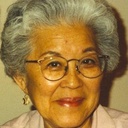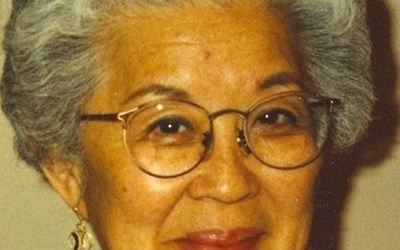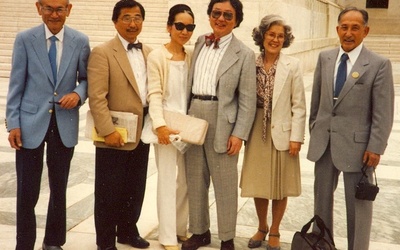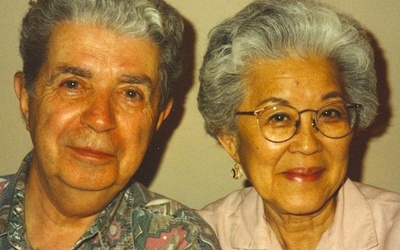
Aiko Herzig-Yoshinaga
Aiko Herzig-Yoshinaga es una figura icónica entre estudiantes, académicos y activistas nikkei (japoneses americanos). Junto con otros 110.000 nikkei de la costa oeste, Aiko pasó la Segunda Guerra Mundial en tres campos de concentración: Manzanar en California, Jerome y Rohwer en Arkansas. Se reasentó en la ciudad de Nueva York, donde se involucró con Asian Americans for Action. Más tarde, se mudó a Virginia, cerca de los Archivos Nacionales en Washington, DC. En 1981 fue contratada como investigadora principal de la Comisión sobre Reubicación e Internamiento de Civiles en Tiempos de Guerra (CWRIC).
Aiko y su marido, Jack Herzig, desempeñaron un papel fundamental en el movimiento de reparación a través de su investigación en los Archivos Nacionales. Los documentos que encontraron también fueron fundamentales en los casos coram nobis que anularon las condenas de guerra de Fred Korematsu y Gordon Hirabayashi. Llevaron a cabo una investigación primaria de documentos oficiales para el Consejo Nacional de Reparación Japonés-Americana en la demanda colectiva, William Hohri et.al., contra EE.UU. Aiko también trabajó para la Oficina de Administración de Compensaciones del Departamento de Justicia para ayudar a identificar a las personas de la comunidad Nikkei elegibles para la disculpa presidencial y el pago de reparación.
Durante más de una década, Aiko recopiló y compartió una lista cada vez mayor de eufemismos que oscurecen, en lugar de revelar, lo que realmente sucedió durante la diáspora nikkei y la experiencia del gulag durante la Segunda Guerra Mundial. Ese documento se amplió para incluir una breve historia personal que revisa su evolución de ex encarcelada y ama de casa ingenua a ciudadana preocupada e investigadora del CWRIC. Un glosario de términos relacionados con la diáspora-gulag nikkei en tiempos de guerra incluye eufemismos que necesitan ser reemplazados y recomendaciones para una nomenclatura más precisa sobre el tema.
Falleció en julio de 2018 a los 93 años.
Actualizado en julio de 2018
Historias de Este Autor
WORDS CAN LIE OR CLARIFY: Terminology of the World War II Incarceration of Japanese Americans* - Part 5
2 de marzo de 2010 • Aiko Herzig-Yoshinaga
Read Part 4 >> While a major controversy between the Nikkei and Jewish communities had been resolved, no such consensus emerged in responses to the JANM’s call for debate among its board members, staff, scholarly advisory group, and volunteers. Some suggested capitulating to the early warnings from the National Park Service, such as JANM board member Grant Ujifusa, who favored dropping “concentration camps” from the title for fear of having the exhibit rejected. But others, including this writer, sent indignant …
WORDS CAN LIE OR CLARIFY: Terminology of the World War II Incarceration of Japanese Americans* - Part 4
23 de febrero de 2010 • Aiko Herzig-Yoshinaga
Read Part 3 >> Witness to a movement in the making Professor Daniels’ admonition resonated among scholars and Nikkei community activists. A “Resolution Regarding Terminology” was adopted by the Civil Liberties Public Education Fund (CLPEF)–a body created in response to one of the recommendations of the Civil Liberties Act of August 10, 1988. The CLPEF resolution states that: In the spirit of its mission, CLPEF Board is taking this opportunity to encourage the public, academia and governmental agencies to begin …
WORDS CAN LIE OR CLARIFY: Terminology of the World War II Incarceration of Japanese Americans* - Part 3
16 de febrero de 2010 • Aiko Herzig-Yoshinaga
Read Part 2 >> Influenced and inspired by others A powerful statement was submitted to the CWRIC during a public hearing in San Francisco on August 13, 1981, by Raymond Okamura, an historical revisionist and activist. Okamura’s 1981 statement to the CWRIC was a compelling review of euphemisms, such as “relocation,” “evacuation,” and other terms that were identical to those on my growing “Work in Progress” list. A year later, his concerns were shared with a broader audience when his …
WORDS CAN LIE OR CLARIFY: Terminology of the World War II Incarceration of Japanese Americans* - Part 2
9 de febrero de 2010 • Aiko Herzig-Yoshinaga
Read Part 1 >> Naive housewife evolves as concerned citizen and political activist It was when my daughter Lisa was in high school, during the turbulent years of the Vietnam war and simultaneous demands for civil rights and social justice at home, that I began to think of words that reflected puzzling contradictions between events as they actually happened versus the words that were used to describe them. We discussed the current news and read of U.S. military press officers …
WORDS CAN LIE OR CLARIFY: Terminology of the World War II Incarceration of Japanese Americans* - Part 1
2 de febrero de 2010 • Aiko Herzig-Yoshinaga
On July 9, 1981, I submitted a memorandum on the subject “Use of term ‘concentration camps’” to the executive director of the Commission on Wartime Relocation and Internment of Civilians (CWRIC). At that time, I was a member of the research staff of the CWRIC. My memo began with this summary of my findings: A search of archival documents reveals that most government authorities, Congressional officials, as well as the public at large, referred to the 1942-46 “relocation centers” as …




